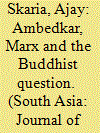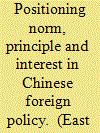| Srl | Item |
| 1 |
ID:
140460


|
|
|
|
|
| Summary/Abstract |
This essay tries to frame one question, which at its most abbreviated can be posed thus: why does Ambedkar convert to Buddhism? Given Ambedkar's militant secularism, to ask this question is also to ask: what assumption of responsibility does that conversion enable which exceeds secular responsibility? This essay tracks how Ambedkar's religion questions both the liberal concept of minority, and the dissolution of the minor that is staged in Marx's critique simultaneously of religion and secularism. Buddhism becomes in the process a religion of the minor.
|
|
|
|
|
|
|
|
|
|
|
|
|
|
|
|
| 2 |
ID:
107163


|
|
|
|
|
| Publication |
2011.
|
| Summary/Abstract |
There are different driving forces behind Chinese foreign policy decision-making. Norms, principles, and interests and the subtle combinations of them, I argue in this paper, are the major driving forces on the input side, while the domestic situation of a specific country and international pressure undercut China's policy deliberations. By contrast, the form of government of a specific country under discussion is not an important variable. In this paper, I use China's policy toward Myanmar as a case study. The findings prove that the integration of norms, principle and practical interests has formed the powerful impetus that drives China's policies toward Myanmar. Among these factors, the interests China has identified in general and stability on its "doorstep" in particular play a dominant role, while the norm of human security and the principle of non-interference are embedded in its policy deliberations.
|
|
|
|
|
|
|
|
|
|
|
|
|
|
|
|
| 3 |
ID:
107181


|
|
|
|
|
| Publication |
2011.
|
| Summary/Abstract |
There are different driving forces behind Chinese foreign policy decision-making. Norms, principles, and interests and the subtle combinations of them, I argue in this paper, are the major driving forces on the input side, while the domestic situation of a specific country and international pressure undercut China's policy deliberations. By contrast, the form of government of a specific country under discussion is not an important variable. In this paper, I use China's policy toward Myanmar as a case study. The findings prove that the integration of norms, principle and practical interests has formed the powerful impetus that drives China's policies toward Myanmar. Among these factors, the interests China has identified in general and stability on its "doorstep" in particular play a dominant role, while the norm of human security and the principle of non-interference are embedded in its policy deliberations.
|
|
|
|
|
|
|
|
|
|
|
|
|
|
|
|